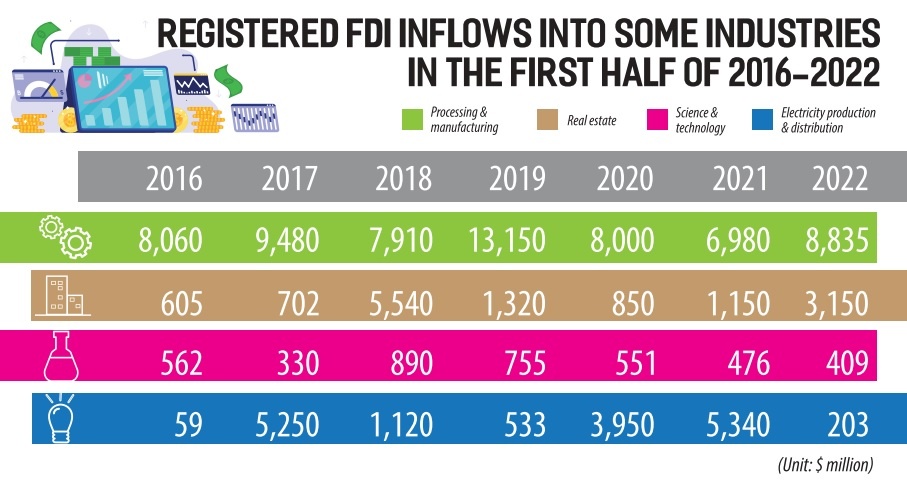Top groups carving out new spaces
 |
“The next few years will show that Vietnam is becoming a major aviation hub and a partner for our industry. So Boeing is determined to be a bigger part of the story in Vietnam,” said Michael Arthur, senior vice president of Boeing and president of Boeing International.
Last August, Boeing opened its first representative office in Hanoi, led by Michael Nguyen, country manager of Boeing Vietnam, to support the group’s growth objectives across its commercial aeroplane and services businesses.
 |
In 2007, Boeing supplier MHI Aerospace Vietnam opened an aeroplane-related manufacturing facility in Hanoi.
In 2014, MHI delivered the 1,000th set of 737 inboard flaps produced in Vietnam and also celebrated its investment in a newly-expanded facility. Boeing 777 and 777X doors are also assembled at this facility. And over a decade ago, Nikkiso Japan also opened a facility near Hanoi producing Boeing components.
“We have suppliers from businesses in Vietnam that work with us directly and indirectly through other partners in Japan and South Korea, among others. So, on every new Boeing aircraft, there is a piece of Vietnam. We would like that piece to be bigger, and that's the purpose of expanding our operation in the country,” said the vice president of Boeing.
Along with Boeing, global tech giant Google is also mulling over plans to cultivate its projects in Vietnam.
Currently, Google is considering moving orders for future smartphones to Vietnam to avoid risks posed by China’s pandemic lockdown, and ongoing trade tensions between the United States and China, according to DigiTimes of Taiwan.
Google was originally reported to be planning to produce its smartphones in Vietnam. However, it ultimately decided to keep its production in China due to a combination of the pandemic coupled with the strong support provided by Chinese supply chains.
However, the lengthy pandemic lockdowns in China have prompted the tech giant to reconsider, because the demand for the Pixel 6 phone in the North American market is increasing sharply. The Google Pixel 7 is also in production, but it will still be built in China as it is similar to the previous model, the Taiwan report said.
In the meantime, the tech giant will transfer a small number of orders to Vietnam for testing. The production line for Google’s new smartphones in Vietnam could be established after 2023 and will be responsible for new-generation models.
Taiwanese-backed Foxconn’s wholly-owned subsidiary FIH, together with Taiwan-based Compal Electronics, are the primary manufacturers of Google’s Pixel line of smartphones. Both FIH and Compal already have factories set up in Vietnam and will be able to meet Google’s demand at any time.
Last month, Nikkei Asia revealed Apple’s plan to move some iPad production out of China and begin to operate in Vietnam after strict lockdowns in and around Shanghai led to months of supply chain disruptions.
China’s BYD, one of the leading iPad assemblers, has helped Apple build production lines in Vietnam and could soon start to produce a small number of the iconic tablets in the country, according to several insiders.
The iPad will become the second major line of Apple products to be made in Vietnam, following the AirPods earbud series. The move highlights both Apple’s continuous efforts to diversify its supply chain and the growing importance of Vietnam to the tech giant.
To date, Apple has relocated 11 factories in the supply chain to Vietnam, with numerous suppliers like Foxconn, Luxshare, Pegatron, and Wistron scaling up facilities in this country.
Oliver Massmann, general director of Duane Morris Vietnam LLC said in May, “Vietnam now has the human resources, technology, government support, and foreign investment to become the next global factory. The country has grown so fast economically and politically in the last five years, that in five years to come, we may see something we wouldn’t even be able to foresee today.”
With new big high-tech investments set to take root in Vietnam, the government is looking at creating new incentives to attract investors, in addition to improving the domestic business and investment markets.
Prime Minister Pham Minh Chinh at the June cabinet meeting on the country’s 6-month socioeconomic review said, “The government will continue boosting administrative reforms and remove as many improper business and investment obstructions as possible to help the country attract more investments.”
What the stars mean:
★ Poor ★ ★ Promising ★★★ Good ★★★★ Very good ★★★★★ Exceptional
Related Contents
Latest News
More News
- Kurz Vietnam expands Gia Lai factory (February 27, 2026 | 16:37)
- SK Innovation-led consortium wins $2.3 billion LNG project in Nghe An (February 25, 2026 | 07:56)
- THACO opens $70 million manufacturing complex in Danang (February 25, 2026 | 07:54)
- Phu Quoc International Airport expansion approved to meet rising demand (February 24, 2026 | 10:00)
- Bac Giang International Logistics Centre faces land clearance barrier (February 24, 2026 | 08:00)
- Bright prospects abound in European investment (February 19, 2026 | 20:27)
- Internal strengths attest to commitment to progress (February 19, 2026 | 20:13)
- Vietnam, New Zealand seek level-up in ties (February 19, 2026 | 18:06)
- Untapped potential in relations with Indonesia (February 19, 2026 | 17:56)
- German strengths match Vietnamese aspirations (February 19, 2026 | 17:40)

 Tag:
Tag:




















 Mobile Version
Mobile Version